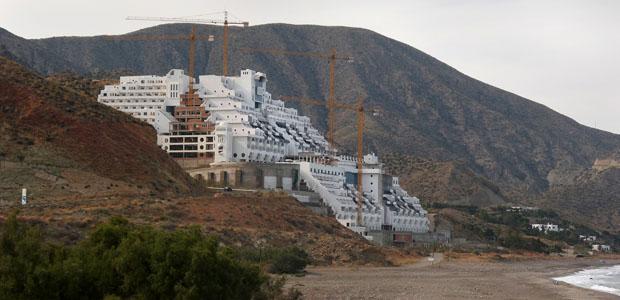Spanish hotel, built in national park, symbol to many of what’s wrong with the country
The 400-room El Algarrobico hotel has been the poster-boy for Spain’s poor coastal management. (Photo by Gerry Hadden.)
Spain is hinting that it might loosen restrictions on homes and other buildings built too close to its coastlines.
The government is under enormous pressure to modify a 1988 law that requires tearing down thousands of structures within about a quarter mile of the sea. The possible changes have given hope to homeowners — and to supporters of one particular hotel on the southern Mediterranean coast.
The controversial, 400-room structure has been a poster-boy for Spain’s poor coastal management for more than a decade. It’s called the Hotel Algarrobico.
The hotel rises like a huge white pyramid against the mountainous coastline of Almeria, Spain. It’s a massive symbol of Spain’s unbridled construction boom. A boom that often led local officials to put making money above the law.
During a recent protest at the site, an activist from Greenpeace laid out the two main laws the hotel violates.
“First,” he said, “it was built within 500 yards of the shore.”
Building that close is illegal because of potential environmental degradation.
“And second, the hotel was built inside a protected national park,” he said.
He’s right. Even the hotel’s owners agree. It’s too close to the beach, and it’s in a park where you’re not supposed to build.
To be clear, the Hotel Algaborrico isn’t actually open. It never opened. In 2006, when it was nearly completed, a judge halted construction based on environmental concerns.
The Greenpeace protest was over the fact that it still hasn’t been torn down.
Greenpeace has been periodically occupying the empty Hotel Algaborrico since 2009. The group once draped the whole thing in green. For a long time many locals cheered the activists on.
In a sense they could afford to. Spain’s building boom still had the economy hot. Few people were out of work.
On the beach right in front of the hotel a man named Armando Cesar Villalba was relaxing recently with his wife and baby, under a sun umbrella. He said he was one of legions of locals once earning good money in bricks and mortar.
“Six years ago I was earning $2000 a month as a grunt on construction sites,” he said. “But all of that work has disappeared.”
He said he now works for three months as a waiter, during the summer tourist season, then gets three months of unemployment.
“It’s no way to live,” he said.
Villalba said when the Hotel Algorrico was going up, he didn’t think much about it. Now he sees the town’s salvation in it.
“This hotel could mean two or three hundred jobs for us,” he said.
That’s significant, given that more than half of the residents in the nearby town of Carboneras lack full-time work. Villalba said he knows lots of people who’d been pre-hired at the hotel.
“Then their hopes were dashed,” he said. “Behind each story like that there are their families and children.”
Villalba said he thinks if the people unite they can get the hotel opened. In fact, in recent months a grassroots push has swelled into a political movement. The mayors of 26 surrounding towns have signed a petition in support of the hotel.
And in a visible turn of sentiment in recent months, some locals have taken it upon themselves to confront Greenpeace occupiers. A couple of young men recently jumped a security fence and entered the empty hotel to demand a dialogue with some activists holed up inside.
In a video of the incident posted on YouTube, you can hear one local ask, “Do you even care about the people of Carboneras? You’re giving the town a bad name!”
It’s hard to hear what the person from Greenpeace yells back.
But whatever he’s saying, fewer local people seem to be listening. Polls suggest virtually all Carboneras’ residents now want the hotel to open.
Part of the new momentum to save the hotel comes from upcoming changes to Spain’s 24-year-old coastal law.
So far, the Environment Ministry has been vague about what those changes are. On the one hand, officials say the law needs more teeth so that folks don’t flaunt it. But they also say they want to improve the legal situation for the owners of existing properties.
If the law is enforced as-is, tens of thousands of homes and hotels would be pulled down. But the crisis is making following through on that unappealing.
First of all, demolition would cost a lot of money. And second, it’s frightening away foreign investment on the coasts — especially among British retirees who’ve flocked to Spain in recent decades.
Tourism is about the only sector in Spain doing well these days.
Given such rumblings in Madrid, no one in Carboneras is ready to believe the hotel will truly disappear. This, despite a Supreme Court decision weeks ago affirming that the hotel is illegal.
The owner of one bar in Carboneras, who didn’t want to give his name, said he understands that. But he wants the hotel to open anyway. He said the town can’t afford to tear it down. He also said whoever is responsible for issuing the illegal building permits should pay, but that local citizens should be spared.
“We’re already struggling to pay our taxes,” he said. “We can barely afford to buy a pair of pants. We shouldn’t have to suffer more because of someone else’s mistake.”
The federal government and the regional government of Andalusia are currently arguing over who should pay for the court-ordered demolition.
But even though the hotel’s days appear numbered, many in Carboneras hold out hope that Spain’s soon to be revised coastal law will spare the complex, and let it open.
